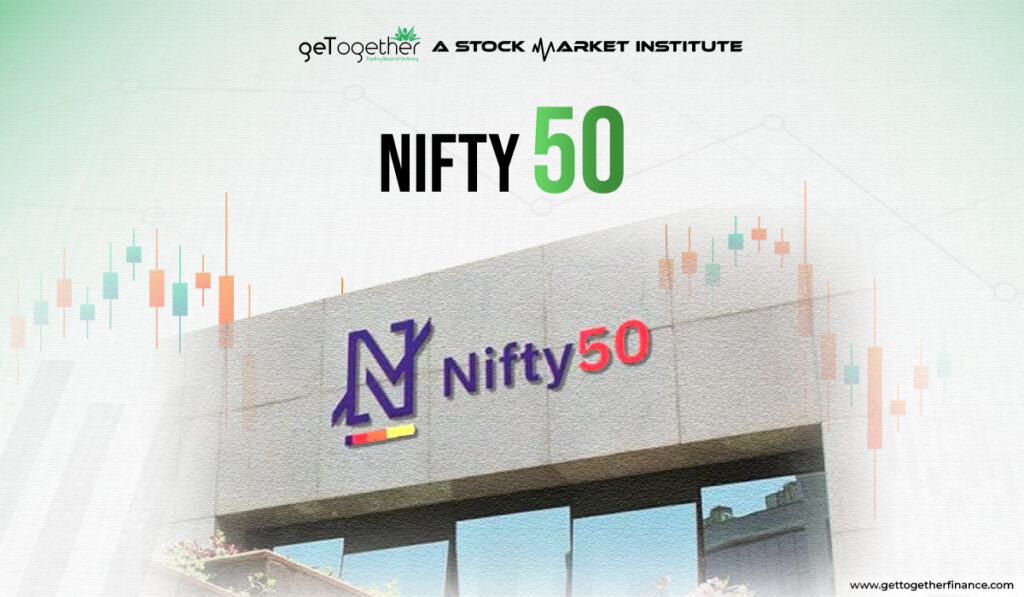Nifty 50
- May 9, 2024
- 3314 Views
- by Manaswi Agarwal


Nifty 50 or Nifty is a stock market index to navigate the financial markets. National Stock Exchange of India (NSE) operates Nifty 50 to track the performance of the overall Indian equity market. It is a stock index that consists of a group of fifty companies from twelve sectors such as energy, metal, pharmaceuticals, IT, consumer goods, etc. As a barometer, the index offers information about the Indian economy and its growing as well as underperforming sectors. Companies like Reliance Industries Ltd, Tata Consultancy Services, HDFC Bank, ITC Limited, etc are listed under the NSE.
Table of Contents
ToggleWhat is Nifty 50?

Nifty 50 is an index which consists of the top 50 companies of India by market capitalization. Investors regularly track the performance of Nifty Fifty to identify the performance of the stock market. Sensex is the other index which is the product of Bombay Exchange of India (BSE). If Nifty Fifty is moving upwards, it indicates a good performance of the Indian economy as the stock market is performing well and vice versa. The performance of 50 companies listed under the index is responsible for the upward or downward movement in the index.
Trading in Nifty 50

Trading can be done in Nifty 50 in only futures and options. The index does not allow trading in equities. National Stock Exchange is responsible for defining the market lot and maturity date of the contract.
Futures: A future contract in Nifty 50 is a forward contract that is based on the performance of Nifty 50 index. The expiry of these trades are scheduled on a monthly basis. The expiry of future contracts have a maximum of 3-month trading cycle. The futures contracts of Nifty 50 expire on the last Thursday of expiry month.
Option: In options trading, there are two ways of trading which are call and put. An option is a contract between two parties where the buyer pays the premium and the seller is obligated to sell the shares in futures because of the premium fee. The expiry in options is on a weekly as well as monthly basis on the last Thursday of expiry month or week.
How to calculate Nifty?

To calculate Nifty 50 in the share market, a free float market capitalization-weighted method is used. The current market capitalization of the stocks that are listed under Nifty fifty is divided by the market capitalization of the base period. In the index value, the current market cap is obtained when free float shares are multiplied by the market price of the share. The base market capital is approximately Rs 2.06 trillion as per the base date which is 3rd November 1995 and a base value of 1000.
The formula for Nifty calculation is:
Value of Index = Current Market Value / (1000*Base Market Capital)
Eligibility Criteria for Nifty Listing
Nifty 50 consists of the topmost companies in the Indian stock market that reveal strong financial statements with robust growth numbers that indicate good market capitalization. The 50 stocks are updated every 6 months to keep up with the trends. Some of the major companies include Infosys, HDFC Bank, ITC, Asian Paints, etc. To be eligible to get listed in Nifty Fifty, a company should be listed on the National Stock Exchange. The stocks registered in the index must be available for trading in NSE’s futures and options. There are several other eligibility criteria that must be understood well:
Market Capitalization
A company has to maintain minimum market capitalization to meet the eligibility requirements of getting listed as a stock of Nifty 50. This helps to ensure that the stock has sufficient liquidity to meet the demands of retail investors.
Liquidity
A company to get listed in the index must be highly liquid in nature to undertake the activities of buying and selling of the shares due to price fluctuations. The liquidity of a company is measured by the average of its impact cost which should be less than or equal to 0.5%.
Governance and Compliance
A company is ought to comply with the regulatory requirements as per the standards of Securities and Exchange Board of India (SEBI). After fulfilling the legal standards, a company is set to get listed in the Nifty Fifty index.
Benefits of investing in Nifty 50 stocks

Stocks listed under the index offer high liquidity and represent the topmost companies of the country. The stocks are professionally managed by the fund managers who ensure that the portfolio of an investor remains in line with the index. Moreover, investing in index funds can also be tax efficient for the investors. Investors have several benefits while investing into Nifty Fifty stocks and these benefits are:
Diversification
In the index, stocks from various sectors are listed altogether that gives flexibility to the investors to diversify their stocks into numerous sectors and eliminate maximum risks. Investing in individual stocks or sectors can be very risky which is why investing in Nifty directly is less risky.
Reduced Costs
In index funds, investors have to pay less management fees that can have a significant positive impact on the overall returns for a long term period. The costs are comparatively lower because of reduced expense ratios.
Growth Potential
The stocks listed under the index contribute to the performance of the Indian economy and have shown consistent growth over the long term. Hence, investing in Nifty provides exposure to invest in stocks that have a contribution towards growth of the Indian economy. Investing in large cap stocks ensures secured long term growth for investors as the companies are well reputed and reliable.
Dividend
Investors can gain additional income by investing in large capitalization stocks as these companies announce dividends regularly to maintain their reputation.
Easy Accessibility
Nifty 50 stocks are readily available for retail as well as institutional investors. These stocks are made available by financial institutions to easily access the Indian equity market.
Also Read: Sensex
Limitations of investing in Nifty 50

Besides having several advantages of investing in Nifty Fifty stocks, there are certain limitations or challenges of investing in the index funds. Investors should be aware of various associated risks that can affect an investor’s portfolio. Let’s understand deeply about the disadvantages of investing in Nifty.
Limited Exposure
Index funds include large cap stocks and do not provide access to the remaining stocks that are listed on the stock exchange. This limits an investor to invest in various stocks available in the market because of which many opportunities are missed. There are several opportunities in mid-cap and small-cap stocks which are missed by investors who are only engaged in large cap stocks.
Economic Risks
The stocks listed in the index are exposed to market specific risks as well as economic risks. Political instability or regulatory changes might affect the index performance and hence make an impact in the overall portfolio of an investor.
Increased Dependency
The performance of an individual stock is dependent on the overall performance of the index. While investing in the index as a whole, the performance of your portfolio is largely dependent on the economic factors. During the downturn of an economy, your portfolio might suffer.
Top Nifty 50 Stocks

Some of the top Nifty 50 stocks listed under National Stock Exchange are:
· Reliance Industries
· Tata Consultancy Services
· HDFC Bank
· ICICI Bank
· Bharti Airtel
· State Bank of India
· Infosys
· ITC
· Larsen and Toubro
Final Thoughts
Investing in Nifty 50 stocks helps in wealth creation over a long term. These stocks represent the performance of the Indian economy. Investors can gain potential returns by investing in these stocks, however, they should carefully evaluate their investment objectives, risks and strategies.
FAQ’S
Q1. What is Nifty 50?
It is an index which is used to navigate the financial market. The index includes 50 large cap stocks of the India equity market.
Q2. What is Bank Nifty?
Bank Nifty is the sectoral market index that tracks the stocks in the banking sector of Nifty. Nifty Bank includes public sector as well as private sector banks.
Q3. Is it safe to invest in Nifty 50 stocks?
Investing in Nifty 50 is much safer because it consists of the large cap companies that contribute to the growth of the Indian economy. These stocks ensure good returns over a long period.
Q4. What are the advantages of investing in Nifty 50?
Investors can have benefits of minimizing their risks and balancing their portfolios through diversification when investing in the index stocks.
Q5. Which are the top performing Nifty 50 sectors?
Healthcare Industry and Information Technology are the topmost performing sectors of Nifty 50 in the Indian stock exchange market.



 Instagram
Instagram
